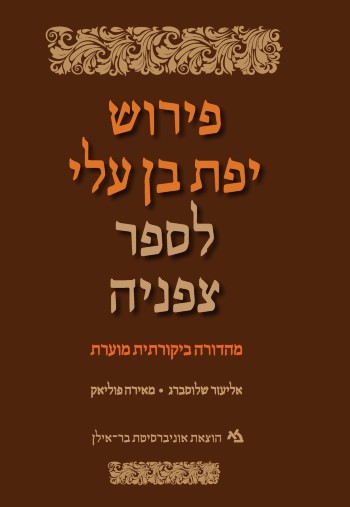
Yefet Ben 'Eli, a great Karaite commentator, worked in Jerusalem in the second half of the tenth century CE, during which time he wrote his masterpiece: a full and comprehensive translation and interpretation of all biblical books in Judeao-Arabic. His innovation and achievements as a biblical commentator, especially in the literary and structural understanding of the Bible, greatly influenced the development of Jewish biblical interpretation in the Middle Ages, both among Karaite commentators, such as Yeshua ben Yehuda and Yaakov ben Reuven, and among rabbinical commentators, such as Rab'a, Radak and R. Tanhum of Jerusalem.
This book is an addition to Yefet Ben Ali's commentary on the Twelve Minor Prophets, and this time on the book of Zephaniah. It was preceded by an annotated critical edition, first in Hebrew, of Yefet Ben 'Eli's commentary on the book of Hosea, which was published in 2009 by Bar-Ilan University Press and was also the result of the collaboration between the current editors.
The edition includes the original Arabic text of Yefet's translation and commentary on the Book of Zephaniah (including critical analysis of manuscripts), and a Hebrew translation accompanied by rich notes and comparisons to sages, medieval sources and even modern sources. The editors preceded the work with an introduction that contextualizes Yefet's work.
The interest in Yefet's interpretations of the Bible has been gaining momentum in Israel and around the world in the last two decades, in both Hebrew and English. The book will interest all those involved in the sciences of Judaism and Islam, the Judeao-Arabic language and culture, as well as those interested in biblical interpretation, prophetic literature, medieval Jewish history, Karaite history and culture, the connections between Arabic and Jewish literature and medieval Jewish and general thought.
Danacode: 110-20298 ISBN: 978-965-226-585-2 Language: Hebrew Pages: 262 Weight: 500 gr Dimensions: 17X24 cm Publication Date: 09/2020 Publisher: Bar-Ilan University Press
Acknowledgements
General Introduction
1. Yefet’s exegetical enterprise
2. Yefet’s commentary on the Twelve Minor Prophets
3. Characteristics of Yefet’s Arabic translation and commentary on Zephaniah
A. The Prophet’s origins
B. The ‘mudawwin’ of Zephaniah
C. Linguistic-contextual exegesis
D. Historical exegesis
E. Literary aspects
F. Multiple interpretations, exegetical reasoning and solution
G. Grammar and language
H. The exegetical rule "muqdam u-meuhar" (‘early and late’)
I. The exegetical rule "moshekh asmo u-moshekh aherim" (‘pulling itself and others’)
4. Description of the Manuscripts and their Editing
A. The relationship between the manuscripts
B. Method of editing
C. The comparative notes
Critical Annotated Edition
Part I - The Judaeo-Arabic text and manuscript apparatus
Chapter 1
Chapter 2
Chapter 3
Part II - Annotated Hebrew translation and comparative notes
Chapter 1
Chapter 2
Chapter 3
Bibliography
Index of Biblical Verses
Eliezer Schlossberg is a professor of Jewish Arabic in the Department of Arabic at Bar-Ilan University. For ten years he headed the department and today he serves as the Dean of the Faculty of Humanities. He specializes in the study of biblical interpretation in the Middle Ages, especially that written in Jewish-Arabic. He has published several books and over a hundred articles on the commentary of Rabbi Saadia Gaon, on the Yemenite midrashim and on the interpretation of the Karaite Bible in the Middle Ages.
Meira Polliack is a professor of biblical studies and is in charge of the chair of Jewish culture in Islamic countries and the study of the Yosef Vassil Meiser Geniza at Tel Aviv University. She served as head of the Department of Biblical Studies. One of the leaders of the international research project: "Arabia Bible: The Bible in Arabic between Jews, Christians and Muslims." It deals with the literary study of the Bible, the history of the acceptance and interpretation of the Bible, and in particular its tradition of translation into Arabic and the development of interpretive models of the Bible in Islamic countries in the Middle Ages.


